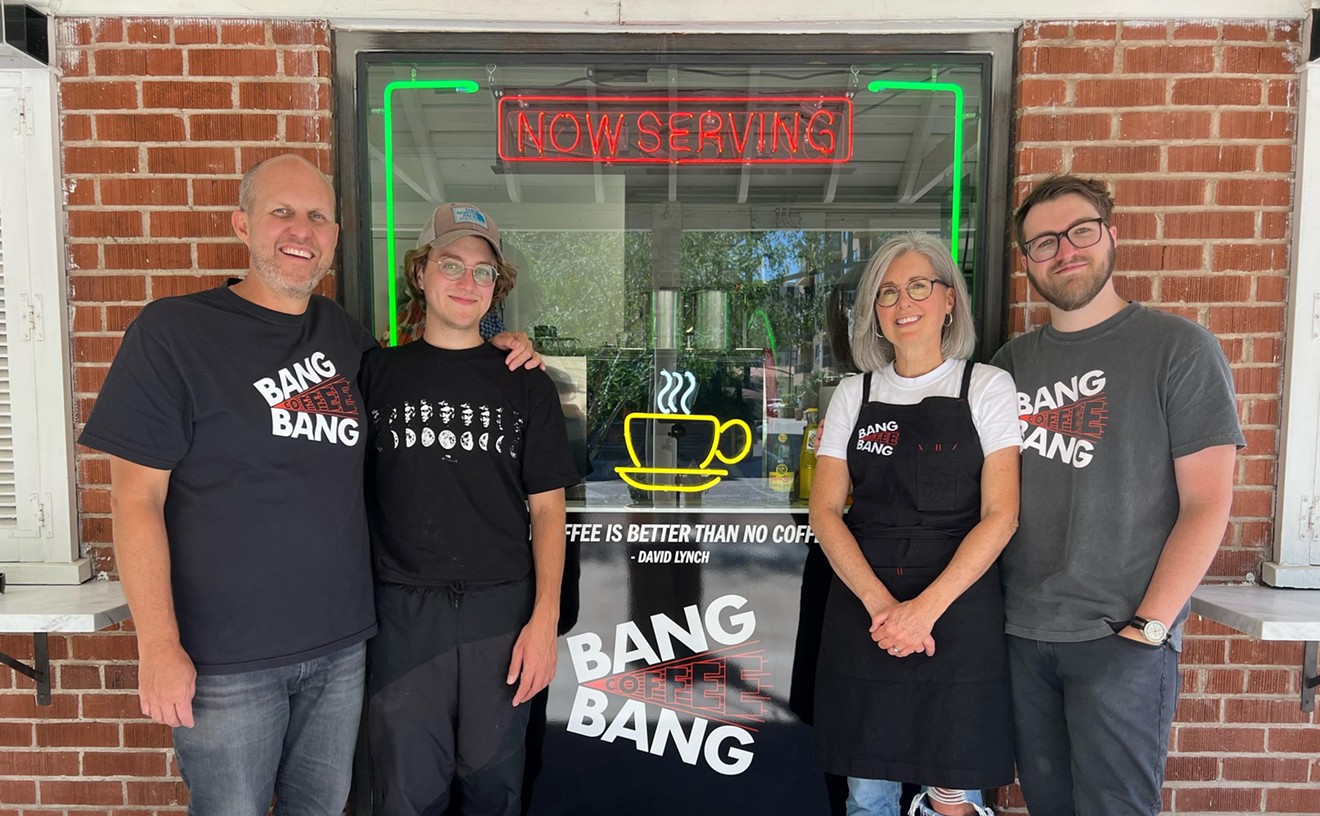When Eliot Wexler set out to open a world-class restaurant in Phoenix, the guy didn't fool around. The Chicago transplant talked his way into Kevin Binkley's kitchen for tips on searing foie gras, got Nobuo Fukuda to share his Japanese fish supply connections, and hooked up with the best organic produce suppliers in town.
And though he's no chef himself, Wexler really became obsessed with the quest to make the perfect doughnut.
With menu items like panéed Berkshire pork loin and lobster tagliatelle in a truffle cream sauce, that might come as a surprise. But over the past three years, Wexler's Noca has become better known for casual Sunday-night suppers of fried chicken and other comfort foods than the fancy stuff. This is hardly KFC; Wexler takes comfort food to a new level.
Enter doughnuts, which have been on the menu from day one, with an ever-changing trio of sauces.
Wexler's personal favorites are the milk jam — painstakingly caramelized milk — and house Nutella sauce. As far as we know, these particular recipes for milk jam and housemade chocolate hazelnut dipping sauce can be found only at Noca, but the gourmet doughnut trend has caught up with Wexler in a big way.
What is it about doughnuts that makes the humble hunk of fried carbs so popular? Wexler has a theory:
"The great thing about doughnuts, in general, is that whatever culture you're from, across the world, there is a doughnut. A variation, a permutation. Whatever culture you were in growing up: You were eating doughnuts."
True, the urge to take dough and deep-fry it appears to be rooted deeply in our DNA. Virtually every culture appears to appreciate a good bit of fried dough, whether served savory or sweet. The Japanese make a sweet red bean-stuffed and fried pastry called an-doughnuts. Finns fill their doughnuts with savory meats. Indians take their doughnut holes, drown them in rosewater syrup, and call them gulab jamun. The French have the beignet, the Germans the Berliner, and the Italians have half a dozen fried-dough concoctions. The list goes on, and Wexler notes that Doughnuts of the World would probably make an outstanding coffee table book.
A little closer to home, there's famed Voodoo Doughnut — the first stop on any hipster's trip to Portland, Oregon. And while you can drop a hunk of cash on a high-end doughnut dessert at the likes of Noca, Cowboy Ciao, and a few other fine dining establishments in Phoenix, there also are indie doughnut shops putting bacon on glazed old-fashioneds and making a mean cruller. (See our sidebar list of places to find doughnuts in the Valley.)
Before opening Noca, Wexler went through virtually every kind of doughnut in his home test kitchen. He knew that he wanted doughnuts on the menu, and he envisioned a medley of them. It was tough work, testing and rejecting jelly doughnuts, glazed doughnuts, yeast dough, and more. In the end, he found himself holding a doughnut straight from his childhood, a doughnut modeled in the spirit of the humble Morton's frozen cinnamon-sugar doughnut. In the early 20th century, a time before microwave ovens and Pop-Tarts, busy parents needing to feed their children raided the frozen-food aisle for stuff that could be heated quickly in an oven. Morton's frozen doughnuts have been out of production for decades now, but Wexler still hasn't forgotten the simple comfort of a hot doughnut before school.
"That's the one I had at my grandmother's house when I went to visit her. Was it the best doughnut I ever had? No, but it's the one that stayed with me," Wexler says.
Guided by that childhood memory, Wexler ended up with a doughnut based around sweet potato dough and rolled in maple sugar, the delicious byproduct of maple syrup production. Wexler gets his sugar directly from a small maple syrup producer in Wisconsin named Greg Pripps. Noca goes through the stuff at an amazing rate — easily more than 300 pounds a year.
Noca's doughnut-making process takes two days. Primarily, this is because it involves roasting sweet potatoes and processing them into dough, a process that results in a light, slightly sweet doughnut. Even though the end product technically is a cake-style doughnut, when it is fresh out of the fryer it has more in common with a delicate French beignet than something designed to sit in a display case all day and be sold by the dozen.
Noca serves an array of desserts, but Wexler is partial to the simple joys of the doughnut: "To me, dessert is not something to get intellectual about. It's supposed to taste good."
With that in mind, Noca has experimented with several other fried-dough combinations. The most popular include a maple bacon doughnut and a doughnut fried in duck fat with a foie gras cinnamon glaze. Wexler describes this particular dish as a "death row meal dessert." For one of Noca's recent "Sunday Simple Supper," a ricotta zepolla was served with honey foam, bee pollen, and lemon curd. Beignets and even churros also have made appearances.
"We have fun with the fried dough. People love the fried dough," Wexler says with a smile.
As good as Noca's doughnuts are, they do not come cheap ($8 for the basic order) — and the place is certainly not open 24/7. If you are looking to score some quality sweet dough at 2 a.m., you will need to look elsewhere.
We caught up with BoSa Donuts' owner Jackson Chao at 10:30 p.m., just after he started a Friday overnight shift. BoSa is a happening place even at this hour; we slipped in just as a dozen teens left with bulging white bags and before a family of five could decide what they wanted.
The original Chandler location was purchased from a Cambodian family in 2006, and Chao and his family have opened at least one new location a year for a total of seven BoSa locations throughout the Valley. When asked about his plans, Chao smiles and says he hopes to open two or three more locations in 2012.
"What customers need, we have to provide," he says.
By way of example, Chao explains that BoSa normally only makes plain or glazed twists. But he is more than happy to whip up a batch of chocolate or maple-glazed twists if a customer requests them. This customer-centered approach is evident in their expansion plans. Chao says he only opens franchises in areas where customers have actually called and requested them.
Chao has made doughnuts for more than 20 years now. The basics of the recipe and, most important, the techniques were taught to him by a relative who had worked in the pastry industry for decades before that. Chao was unwilling to share the specifics of his process, asking simply, "Why is In-N-Out so popular?" By his reckoning, BoSa is popular because they combine quality ingredients with consistent execution.
Though the process may be a mystery, the product is not. Chao says that his customers appreciate several things about his doughnuts. First, they want something that is light and fluffy, not greasy and dense. Second, they are looking for a doughnut that is satisfying without being cloying. He repeated a refrain heard at many an Asian bakery: "Not too sweet."
So doughnuts are hip and cool, right? People are buying them by the dozen at places like LaMar's or BoSa and shelling out real money to score gourmet doughnuts at places like Noca.
But if doughnuts are hot, then why did doughnut giant Krispy Kreme go from 11 Arizona stores in 2010 to just one this August?
If you have to ask, then you've never tried one a doughnut at BoSa, let alone one of Eliot Wexler's.










